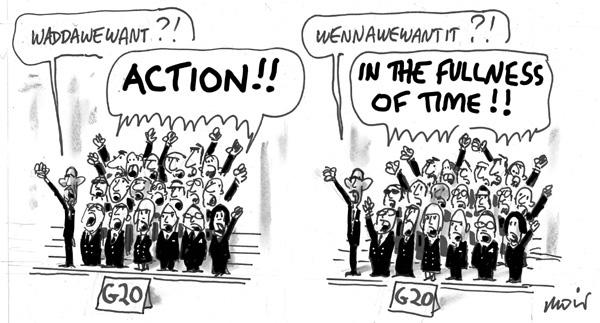Search
Democracy Links
Member's Off-site Blogs
the power of posturing .....

The one-day extravaganza called the G20 summit meeting ended on April 2 just as most political meetings ended: with a lot of promises, few specifics, and no identification of who will pay.
What is a summit meeting? It is a junket for heads of state. What is a junket? It is a taxpayer-funded trip abroad for Congressmen and their wives – and sometimes without their wives, for the really popular junkets.One skeptic estimated that, given the amount of time set aside for the official meeting, if every national politician delivered his speech, he would have only 11 minutes to get his ideas across. This assumes that the politicians from the other 10 countries did not get an opportunity to give a speech. If all 30 gave speeches, each one would have had a total of seven minutes to make his sales pitch.
At the end of the meeting, a document called the Leader's Statement was distributed. It is eight pages long. It is obvious that the details of this document were agreed to long before when a committee of bureaucrats sat down and wrote the Leaders' Statement for them. These proposals were written by higher committees of faceless bureaucrats, sent to other faceless bureaucrats in other nations, were cleared by political advisors, and then were sent to the text-drafting committee.It is amazing how little of substance there was in this position paper. It said that governments need to strengthen global financial institutions. Then it launched into the question of emerging markets.
Emerging markets and developing countries, which have been the engine of recent world growth, are also now facing challenges which are adding to the current downturn in the global economy. It is imperative for global confidence and economic recovery that capital continues to flow to them. This will require a substantial strengthening of the international financial institutions, particularly the IMF.This assumes that the crisis of global financial institutions in some significant way hinges on a bunch of third-world countries run by various tribal dictators and socialist planners. It assumes that the Western taxpayers owe all this money to third-world banana republics. It assumes that the solution to the worldwide economic crisis is somehow dependent on the transfer of about a trillion dollars to the tinhorn dictators who run the banana republics.
The IMF has been doing this for 60 years, and the result has been the same for all 50 years: the bureaucratization of economic production in direct proportion to the amount of money that the IMF has handed over to local political leaders. The late, great economist P. T. Bauer spent his career chronicling foreign aid projects. They were loss-producing from day one.The paper was somewhat confused as to exactly how much will be allocated to the IMF for which projects. Big numbers appear throughout the paper. The IMF has very few resources of its own. The IMF will be authorized to sell gold, possibly up to $50 billion worth, in order to raise money. The gold market dropped by over $20. Yet it should be obvious to anyone who understands the central banks that most or all the IMF's gold will be bought by the central banks. The general public will see none of it.
I am not one to say that $1 trillion is not a lot of money. However, this worldwide economic recession destroyed approximately $50 trillion of capital in 2008 alone.
I fail to see how an additional trillion dollars to be distributed to third-world countries by the International Monetary Fund is going to make any significant difference.- By John Richardson at 4 Apr 2009 - 9:01pm
- John Richardson's blog
- Login or register to post comments
Recent comments
9 hours 54 min ago
12 hours 3 min ago
13 hours 11 min ago
13 hours 17 min ago
13 hours 23 min ago
15 hours 33 min ago
15 hours 43 min ago
16 hours 43 min ago
17 hours 39 min ago
18 hours 4 sec ago